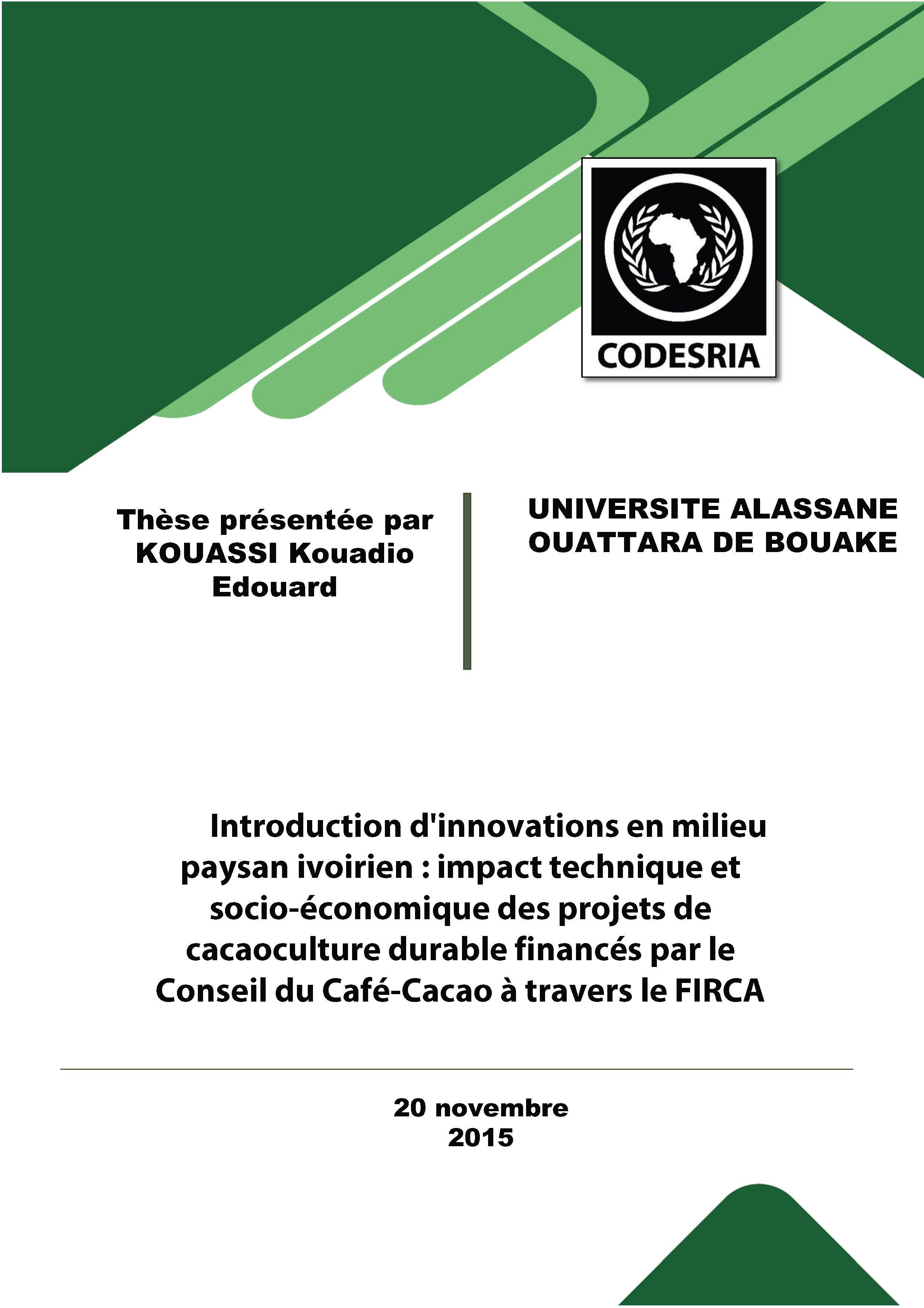Introduction d'innovations en milieu paysan ivoirien : impact technique et socio-économique des projets de cacaoculture durable financés par le Conseil du Café-Cacao à travers le FIRCA
Keywords:
Innovations agricoles, projets agricoles, agriculture durable, cacaoculture, conseil agricole, bonnes pratiques agricoles, CamerounSynopsis
Agricultural advice has always been the weak link of Agriculture in Côte
d'Ivoire. Since colonial limes, actions Agricultural Advisory conducted with farmers
have almost ail ended in failure, especially in cocoa where yields have remained very
low and the living conditions of farmers remain precarious. Thus, the prospects for a
sustainable cocoa are seriously put into causes.
This study raises the question of the impact of recent innovations introduced in
cocoa cultivation sector in Côte d'Ivoire, prey to various threats. In recent years, several
cocoa regeneration projects have bcen initiated to deal with these threats. The study
therefore aimed to assess the impact of various projects initiated by the Agricultural
Advisory Board Café-Cacao through FIRCA, for cocoa farmers in the Program
Quantity, Quality, Growth (2QG). Thus, the study attempt to measure the Jevel of
adoption of Good Agricultural Practices (GAP) and the impact on productivity of cocoa
and the living conditions of farmers. She plans to understand and explain the
motivations that guide the adoption of GAP or persistence of Traditional Cultural
Practices (TCP).
To do this, she enrolled in a Knowledge approach, Attitudes, Practices (KAP) to
characterize and quantify the diffusion and adoption of GAP implemented at farm Jevel
in different production areas in Côte d'Ivoire. Three complementary theories (diffusion
theory, Mode! Acceptance of Technology and theory of behaviour change) were
mobilized to guide data analysis.
Complementarity between the sociological and agronomie approach has lead to
the results. These ones results show that the adoption is difficult and selective with
respect to several constraints, including economic and social, faced by fanners. The
desired impact in tenns of productivity and living conditions of farmers remains
invisible.
Downloads
References
ACHEROY, C. (2005), Effets et impact du développement. Echos du Cota, n°107 Bruxelles, 34 p.
ADAMS, A. (2000). A grassroots view of Senegal River deve!opment agencies: OMVS, SAED.
Submission ta World Commission On Dams. International Rivers
twork.http://www.irn.org/ programs/safrica/ index. php? id=man.000307 .html.
(consulté le 20 décembre 2012)
AFFOU, Y. S. (1990), La relève paysanne en Côte d'Ivoire : étude d'expériences vivrières.
Karthala/Orstom, Paris, 225 p.
AFFOU, Y. S. (1994), « Renforcement des organisations paysannes: obstacles ou atouts au progrès
agricole», ORSTOM, Abidjan, pp 1-10
AFFOU, Y. S. (1999), « Environnement technologique de la production agricole : exemple de la
Côte d'Ivoire». In Chauveau, Cormier-Salem & Mollard. (Eds), L "innova/ion en
agriculture : queslion de méthodes el terrains d"observalion, !RD, pp.169-186
AFNOR Groupe (2009), Traçabilité, retrait/rappel et gestion de crise, module de soutien n°!0,
http://www.afnor.org/profils/activite/agroalimentaire/focus-la-norme-iso-
/la-norme-iso-22000 ( consulté le 17 avril 2014)
AJZEN, 1. & FISHBEIN, M. (1980). Understanding attitudes and predicting social behavior.
Englewood Cliffs, NJ: Prentice-Hall Inc. http://www.pearsonhighered.com/
educator/academic/product/0,013 93 64 3 5 8,00%2ben-US S _ 0 1 D BC.html
(consulté 17 novembre 2012)
AJZEN, 1. (1991), « The theory of planned behavior ». Organizational Behaviour and Human
Decision Processes, n°50, pp 179-211.
ALBALADEJO, C. & CASABIANCA, F. (1997), La recherche-action : ambitions, pratiques,
débats. Études et recherches sur les systèmes agraires et le développement n° 30,
Inra, 212 p.
AMOUKOU, A. (2004), « Influence des facteurs anthropiques et des flux de gènes sur la variabilité
génétique des formes cultivées et spontanées du mil dans deux localités du
Niger». ln Gilles Bezançon, Jean-Louis Pham (dir.). Ressources génétiques des
mils en Afrique de l'Ouest. !RD, http://books.openedition.org/
author?name=amoukou+adamou+i. ( consulté le 15 mai 2014)
ANDREANI, J-C. & CONCHON, F. (2005), Méthodes d'analyse et d'interprétation des études
qualitatives: état de l'art en marketing, ESCP-EAP, INSEMMA, Paris, 26 p.
ANONYME, (1996). Matrice d'impact des pratiques culturales. Gestion de l'environnement du Sud
Cameroun. Pratiques culturales ayant des effets sur l'environnement. Projet Appui
à la Protection De l'Environnement au Cameroun-Sud, rapp01t d'étude, U.D.D,
Canada. 8 p.
ANONYME, (2005). Document de synthèse des données économiques de la filière crevettière.
Observatoire Economique de la filière crevettière à Madagascar. http://
www.fao.org/fishery/countrysector/naso madagascar/fr (consulté le 17 janvier 2013)
APPLETON, S. & al. (1996), « Education and health in sub-saharan Africa ». Journal of
international development, vol. 8, n°3, pp 307-339






